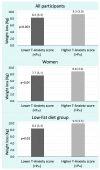Changes in Anxiety and Depression Traits Induced by Energy Restriction: Predictive Value of the Baseline Status
- PMID: 31141954
- PMCID: PMC6627283
- DOI: 10.3390/nu11061206
Changes in Anxiety and Depression Traits Induced by Energy Restriction: Predictive Value of the Baseline Status
Abstract
Current evidence proposes diet quality as a modifiable risk factor for mental or emotional impairments. However, additional studies are required to investigate the effect of dietary patterns and weight loss on improving psychological symptoms. The aim of this investigation was to evaluate the effect of energy-restriction, prescribed to overweight and obese participants, on anxiety and depression symptoms, as well as the potential predictive value of some baseline psychological features on weight loss. Overweight and obese participants (n = 305) were randomly assigned for 16 weeks to two hypocaloric diets with different macronutrient distribution: a moderately high-protein (MHP) diet and a low-fat (LF) diet. Anthropometrical, clinical, psychological, and lifestyle characteristics were assessed at baseline and at the end of the intervention. The nutritional intervention evidenced that weight loss has a beneficial effect on trait anxiety score in women (β = 0.24, p = 0.03), depression score in all population (β = 0.15, p = 0.02), particularly in women (β = 0.22, p = 0.03) and in subjects who followed the LF diet (β = 0.22, p = 0.04). Moreover, weight loss could be predicted by anxiety status at baseline, mainly in women and in those who were prescribed a LF diet. This trial suggests that weight loss triggers an improvement in psychological traits, and that anxiety symptoms could predict those volunteers that benefit most from a balanced calorie-restricted intervention, which will contribute to individualized precision nutrition.
Keywords: anxiety; depression; hypocaloric diet; macronutrient distribution; overweight; weight loss.
Conflict of interest statement
The authors declare no conflict of interest concerning this research.
Figures





References
-
- Kushner R.F., Kahan S. Introduction: The state of obesity in 2017. Med. Clin. North Am. 2018;102:1–11. - PubMed
Publication types
MeSH terms
LinkOut - more resources
Full Text Sources
Medical

